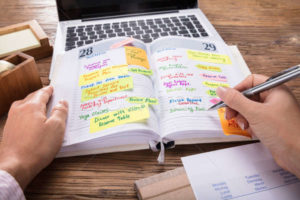
Personal productivity is often driven by your ability to focus on the task at hand.
At the start of a brand new year, you’ve likely set some lofty work-related goals for yourself, for your department or for the organization. And in order to achieve these ambitious milestones, it will likely take a lot of effort and concentration to achieve them. Two major challenges are destroying your ability to focus, by creating undesirable distractions.
First, the hyperconnected state enabled by technology does not allow us to process, recharge, and refocus. The digital haze that hovers over our heads – whether it’s in the form of pointless notifications on our mobile devices, streaming YouTube videos or music on our PCs, or incessant emails that disrupt our sense of flow – can keep us from accomplishing important tasks. Although technology has helped advance and streamline many mundane tasks, it too often leads to distraction, anxiety, and reduced effectiveness.
Second, the reliance on meetings as the default form of interaction with other people at work leads to time lost and feelings of burnout. We spend anywhere from 20–50 percent of our time, and sometimes much more, in meetings. And in these meetings we are tying up key individuals whose efforts are needed to manage priorities or perform complex tasks. Yet sadly, these too-frequent and calendar-committed meetings often fail to advance the agenda.
If we want to stay focused on truly meaningful activity, something has to change. We need to carve out more time for ourselves if we want to remain focused and effective at work.
These five daily practices will help.
-
1. Practice mindfulness.
-
2. Organize tasks.
-
3. Clean up.
-
4. Shrink meetings.
-
5. Preserve buffers.

The single biggest mistake most of us make is in how we start the day. When you first wake up, do you immediately roll over and start checking email on your phone? Bad idea. By constantly engaging your stress response when you check your phone, you undermine the very cognitive abilities — like memory and attention — that you so desperately need. Instead, start trying a simple mindfulness practice when you wake up, which can be anything from quietly taking a few deep breaths to meditating for 20-30 minutes. Train your nervous system to calm yourself despite the stress of our daily lives. When you are calmer, you are more emotionally intelligent and make better decisions. (Not a bad way to start the day!)

Another common mistake is letting other people fill in your calendar, particularly in the morning. Make sure you leave enough time in the workday to accomplish complex, creative tasks. A single meeting can blow an entire day by breaking it into pieces, each too small to do anything challenging within the remaining available time. Creative tasks require dedicated time when you are fresh, not a few distracted minutes squeezed in-between meetings. Instead of struggling to accomplish what matters, take advantage of your body’s natural rhythms. Focus on complex, creative tasks in the morning, when you are most fresh; these things will tend to be ones you accomplish individually or with 2–3 other people. Push all other meetings to the afternoon when these simpler, execution-focused meetings with larger groups are easier to handle.

Is your desk or workspace a mess? What about the on-screen desktop of your computer or mobile device? These areas might seem insignificant in the grand scheme of things, but your environment affects your productivity and quality of work. Tidying up has a big impact! Keeping a clean work environment – both physical and digital – is essential to our ability to stay focused and avoid distraction. At work, put everything in a drawer. Create folders on your desktop to get rid of all the random files, and keep only the most important 8–12 apps on your home screen. Turn off all unnecessary notifications. Don’t let yourself get distracted by all the clutter — you will stay focused for much longer!

How many people were in your last meeting? More important, how many of them were actually involved in the creation or fulfillment of deliverables from that meeting? How long did that meeting last? Importantly, did it really need to take that long? Focus and responsibility are more challenging with too many people in the room — which is how you end up with folks staring down silently at their smartphones or laptops for an entire meeting. To stay focused, keep your team focused. Reduce your meeting length and the number of attendees. Limit the number of people in any meeting to 8 or fewer unless it is a meeting that is purely informational (and therefore kept short!). Schedule the meeting to last no more than 60 minutes and invite only those who truly need to be there. Make sure each meeting focuses on a previously publicized agenda, identifies a timekeeper and a facilitator, results in well-understood action items, sets a specific timeline for each action item, names one (yes, 1!) person for each action item who is responsible for ensuring that it gets done, and publicizes a meeting record of decisions.

One reason so many people have a hard time staying focused is a lack of margin or buffer. You cannot be on top of your game if you run from meeting to meeting. Switching tasks and contexts is difficult for the human brain at any time, and that ability degrades throughout the day. For busy managers and executives, this means up to 70 percent of their time at work is wasted. If you want to avoid wasting the day, add buffer time between each meeting. For every 45–60 minutes you spend in a meeting, make sure to take 15 minutes or more (immediately afterwards!) to process, reflect, and prioritize. This will keep you from wasting time and will help avoid that burned-out feeling at the end of each long day.
Staying focused at work is not easy, but it is doable. These 5 practical techniques will help you stay on task, accomplish what matters, and enjoy yourself more throughout the day.
(written by: Nelson)

